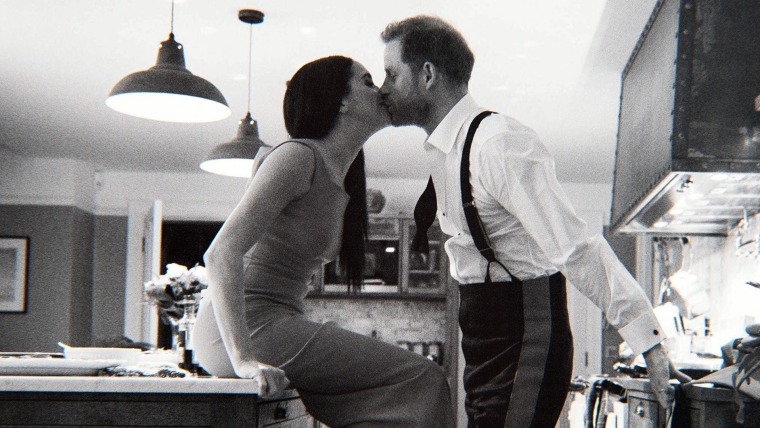At the start of their new, much-anticipated Netflix docuseries “Harry & Meghan,” the Duchess of Sussex — the woman formerly known as Meghan Markle — is asked what her motivations are for creating the documentary.
“When you feel like people haven’t gotten any sense of who you are for so long, it’s really nice to just be able to have the opportunity to let people have a bit more of a glimpse into what’s happened and who you are,” she responds.
The couple may be polarizing, but they are incredibly prolific narrators of their own past.
That may be her stated motivation, but what follows over the next three hours is mostly a narrative that we’ve already heard several times in the nearly three years since Harry and Meghan first announced their intention to step back as “working” members of the royal family. It’s an interesting choice for a couple whose professional and financial future relies on their ability to keep the public interested.
Indeed, the couple may be polarizing, but they are incredibly prolific narrators of their own past. Freed from the constraints of the royal family’s “never complain, never explain” policy and without an NDA, as Meghan disclosed in her interview with The Cut earlier this year, Harry and Meghan now had free rein to discuss their time as working royals, and the factors that led them to leave their roles.
And discuss they did: Most notably, tens of millions of people in the U.S. and the U.K. watched as the Sussexes sat down with Oprah Winfrey to discuss their royal past and relationship history, in March 2021. But there were also Harry’s appearance on the “Late Late Show with James Corden” in February 2021, his chat with Dax Shepard on “Armchair Expert” in May 2021 and the mental health-focused Apple TV show “The Me You Can’t See.” Meghan, meanwhile, did interviews with The Cut and Variety, visited the “Ellen” show, and opened up on her own podcast, “Archetypes.”
And it’s not over yet: Harry has a memoir coming out early next year.
The couple’s Oprah interview, where Meghan discussed experiencing suicidal ideation during her first pregnancy and the couple accused an unnamed family member of questioning the color of their unborn child’s skin, was filled with new information. As such, it was undeniably riveting.
This series feels underwhelming by comparison. Its most interesting moments are exclusive interview with Meghan’s mother Doria Ragland and Harry’s reflections on his infamous 2005 Nazi costume.
Because despite the personal touches, the series can’t escape the transactional elephant in the room. This is the first product of a content deal with Netflix reportedly worth in the neighborhood of $100 million, and a chance for Harry and Meghan to prove themselves as a worthy investment to potential brand partners.
This series seems unlikely to instigate the same sort of strong reactions — and that’s perhaps the worst-case scenario.
The Oprah interview won Harry and Meghan a swell of support, but also prompted some audience anger. This series seems unlikely to instigate the same sort of strong reactions — and that’s perhaps the worst-case scenario. By their own admission, the couple are now “financially independent” and reliant on commercial deals to fund their lifestyle. If they can’t retain public interest in the long-term, it’s bound to impact their earning potential.
The royal family today must constantly justify its existence in the modern world. That’s what pushes them onto social media and to embrace causes like climate change through projects like the Prince of Wales’ Earthshot Prize, which awards grants to environmentally focused organizations. But Harry and Meghan’s challenge may be even bigger.
Without a formal attachment to the institution that made people care about them in the first place, they have to give people a reason to stay interested. Pulling back the curtain on the inner workings of the monarchy can only take them so far, and already, they seem to be running out of new stories to tell about that period. This is understandable: They’ve been out of the royal family for almost double the amount of time that Meghan spent within it.
Clearly, the royal halo effect is dimming. It isn’t gone entirely, of course — they still have their titles, and Harry will always be a prince. This happens for every royal (except the direct heirs) as they age and get further away from the throne, but those who remain working members of the family also retain vital institutional support.
But if Harry and Meghan want to retain their superstardom in the long-term, and the corresponding earning potential, they need to convince the masses to care about more than just their royal history. This series could have been an opportunity to plainly lay out their vision for the future beyond vague promises to lead a “life of service.” At the very least, it could have offered something new about their present, like an in-depth look at how they’re navigating life in California and building their Archewell foundation. These are things that would help fans remain invested in their next chapter.
Instead, it’s rehashing the same stories we’ve heard for the past six years: Their courtship, engagement, issues with the media and circumstances that led them to flee. There’s still three episodes to go, but given the fact that we’re only just arriving at their wedding, it seems unlikely the series will go deep on the post-royal life.
There aren’t many examples of ex-British royals who have been able to find success outside of the family: Harry’s aunt Sarah, the Duchess of York (also known as “Fergie”) famously took on deals with companies like Weight Watchers to pay the bills after her divorce. After abdicating the throne in 1936, the Duke of Windsor spent his life in exile in France, listless and unable to find a purpose beyond reminiscing about his status as a one-time King.
Harry and Meghan still have the potential to be a unique hybrid of unofficial statespeople, philanthropic ambassadors and celebrities with a near-celestial kind of star power. But to achieve that status in a lasting way, they need people to be invested in their future — not only their past.
Source: | This article originally belongs to Nbcnews.com










